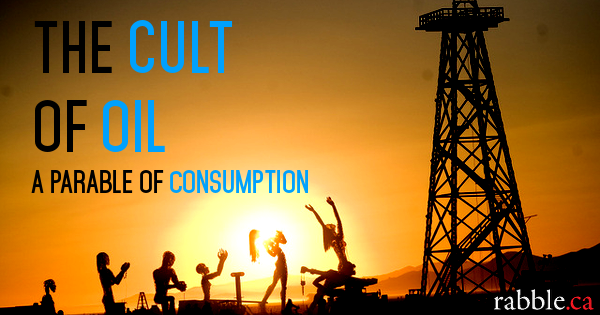Imagine a society — technically advanced, but spiritually impoverished — that has been taken over by a fire-worshipping cult. Most people are members, though sometimes reluctant ones. Many cult members recognize that the cult is dangerous — creating violent storms, rising seas, stripped forests, dead oceans — but feel powerless to escape.
Scientists in this society have issued strong warnings about the cult, painstakingly documenting the many negative consequences of its uncontrolled use of fire. But the society’s rulers have banished these scientists from positions of influence and forbidden them to speak in public.
In this society, corporations seek to extract as much combustible material from the Earth as possible. Governments maintain taxation systems that encourage this. Economists obsess constantly about the price of fuel.
People in this society are scarcely aware of the millions of fires burning away in cars, factories, power plants and home furnaces. An effort to paint fuel tanks bright red rather than dull grey is easily quashed. Although an entire town is incinerated when a run-away fuel train crashes and explodes, the cult leaders explain that this can be avoided in the future by moving fuel by other means. People quickly return to their complacency about the dangers of uncontrolled fuel consumption.
Corporations that profit from over-consumption of fossil fuels and other extractable resources provide woefully inadequate information about actual levels of use. Governments collude with corporations in encouraging ignorance and waste, sometimes actively resisting conservation measures.
Rejecting science, the society’s rulers (the cult leaders) and their subjects have turned to a primitive religion known as capitalism. The cult leaders maintain that belief in this religion allows cult members to transcend all physical limits to growth.
At the core of this religion — scarcely ever mentioned, and never depicted in art or literature — is the Fire God. Worshipping Him brings money, material possessions and political power. The cult leaders build immense monuments to the Fire God, altering the landscape with tubular metal structures and concrete strips that span continents.
But the Fire God exacts a terrible price. He is vengeful and can destroy life. He is the God of over-consumption: His flames indiscriminately burn everything. Cult members — rulers and subjects alike — must agree to sacrifice their grandchildren to Him.
Scholars of the cult explain that although early human societies worshipped fire, they identified four other main elements of creation: earth, water, air, and ether (or spirit). All five elements were considered sacred. Early societies balanced their attention among the five elements, ensuring that none received undue emphasis.
These scholars trace the origins of the fire-worshipping cult to Greek mythology. After Prometheus steals fire and gives it to humans for their benefit, Zeus punishes him by chaining him to a rock. While Prometheus becomes immortal, an eagle comes each day and pecks out his liver. Prometheus’ liver grows back each night, but this means that he must endure the ceaseless pain inflicted by the eagle.
Most cult members are unaware of these origins. If they knew of them they would probably think that they (but perhaps not their grandchildren) will escape Prometheus’ fate.
Some people leave the cult, but it isn’t easy. The cult leaders lure people back with seductive messages: “Join us and you will live in a spacious home, travel to exotic places, eat the finest foods from around the world, and be entertained on demand.”
The cult’s escapees realize that individual action alone will not free the world from domination by the fire-worshippers. They start a global movement to heed the scientists’ warnings and take power away from the cult.
Some escapees make plans to attend a global conference in Paris, in December 2015, which is intended to create a legally binding global agreement to stop the uncontrolled use of fire. The fire-worshippers make plans to attend this conference as well. The only attendees who will get to decide on the final agreement are those who represent national governments. Many national governments are controlled by the fire-worshippers, making it unlikely that an effective agreement will emerge.
Among the most radical, fundamentalist fire-worshippers are the rulers of a country known as Canada. However, a national election will take place in Canada before the Paris conference and voters are uncertain if continued rule by the fire-worshippers is in their best interests.
The rest of the story remains untold.
Ole Hendrickson is a forest ecologist and current president of the Ottawa River Institute, a non-profit charitable organization based in the Ottawa Valley.




